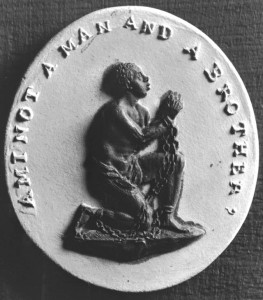By Peter Corney
 Currently we are in a climate of opinion where “Human Rights” are now the gold standard for moral decisions. Although most contemporary people know little of their history, the preupositions behnd them or their philosphical and theological foundations.
Currently we are in a climate of opinion where “Human Rights” are now the gold standard for moral decisions. Although most contemporary people know little of their history, the preupositions behnd them or their philosphical and theological foundations.
When English Christians in the late 18th and early 19th C. began the process of sensitizing their nation’s conscience to it’s involvement in the Trans Atlantic slave trade they chose a very significant campaign logo. The logo was a picture of an African slave in chains, his hands raised in pleading, surrounded with the words “Am I not a man and a brother?”
This logo and these words captured succinctly two fundamental Biblical and Christian ideas that deeply influenced the Abolitionists and have profoundly shaped the development of international charters of Human Rights. “Am I not a man..?” implied for the Christian abolitionist the Biblical idea that because we are all made in the image of God we are all equal and precious and should be treated as such. The second part; “.. and a brother?” conveyed the idea that we are brothers and sisters, not only in the sense of ‘the universal brotherhood of man’ but also in the NT sense that in Christ “there is neither Jew nor Greek, slave nor free, male nor female, for you are all one.” (Gal.3:28). How can one oppress and enslave a brother or sister?
These ideas are further underlined by the Christian belief in the incarnation; that God in revealing himself in Christ took on human flesh. This belief reinforces the dignity, the precious and sacred nature of every human person and therefore their inalienable rights.
Jesus applied the point sharply when, speaking about either our neglect or care for another person in need, said: “In that you did it unto the least of these you did it unto me.” (Math 25:40)
The early organizing committee of the English anti slavery campaign was made up of Anglicans and several Quakers. A number of the key members were also members of the Evangelical Anglican Church Missionary Society (CMS), they formed a sister society to pursue the campaign known today as “Anti Slavery International”. William Wilberforce and Thomas Clarkson stand in this tradition. Historically there is a direct line of descent and influence from these organisations to the later developments of the International Labour Organisation (ILO) working for the rights of workers, campaigns for the Rights of Children and eventually to the UN Declaration of Human Rights (1948). It was not the only influence but a large slice of the activist gene pool that eventually produced the UN Charter can be traced back to the English Christian anti slavery campaigners. There were also several very influential christians on the drafting committee like the Catholic philosopher Jacques Maritain.
The influence of Christians on human rights goes back much further than the 18th and 19th C. in England. It goes back to the radical Puritan Christians of the 16th and 17th C. like the Levelers and the Diggers and later the Quakers. They argued from the Bible against inherited privilege that made certain rights an accident of birth. Rights like land holding and positions of power in government associated with the aristocracy. Their ideas fed into the brief but influential period of The Commonwealth (1649-53). The dramatic events that followed influenced “The Bill of Rights of 1689” an early statement of political and legal rights in England.
It should be remembered that it was a Puritan lawyer John Cooke following his conscience and sense of moral duty who accepted the brief to be the prosecutor of Charles I for crimes against his own people (1649). He was the first lawyer to prosecute a Royal European head of state for such actions. (1) Up till this time it was accepted that a king made the law or was the law, he certainly was not subject to the law. The brave John Cooke argued that even the King was subject to the law. The notion of command responsibility under which war criminals today like S. Milosevic have been tried and found guilty by the International Court can be traced back to John Cooke’s ground breaking act of courage and pioneering justice. This can be seen as an early advance for the rights of victims of crimes committed by those abusing power over them and an early legal argument for calling tyrannous regimes to account. It’s influences can be traced to the radical Christian values of the early Puritans. (2)
Footnotes:
(1) See “The Tyrannicide Brief” by G. Robertson (Chatto and Windlus 2005)
(2) See also the excellent survey of how Christianity has shaped Western values in Nick Spencers fine book “The Evolution of the West” 2016 by SPCK.
